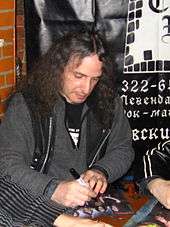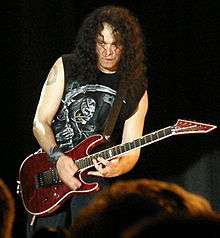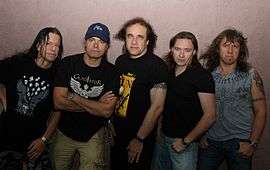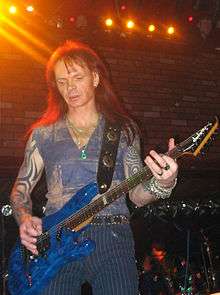Aria (band)
| Aria | |
|---|---|
|
L-R are: Udalov, Popov, Holstinin, Zhitnyakov, Dubinin | |
| Background information | |
| Origin | Moscow, Soviet Union |
| Genres | Heavy metal, power metal |
| Years active | 1985–present |
| Labels | Moroz Records, CD Maximum |
| Associated acts | Kipelov, Master, Sergey Mavrin, Epidemia, U.D.O., Grand Courage |
| Website | http://www.aria.ru/ |
| Members |
Vladimir Holstinin Vitaly Dubinin Mikhail Zhitnyakov Sergey Popov Maxim Udalov |
| Past members | Valery Kipelov, Sergey Mavrin, Sergey Terentyev, Alik Granovsky, Andrey Bolshakov, Alexander Maniakin, Arthur Berkut, Kirill Pokrovsky |
Aria (Russian: Ария) is a Russian heavy metal band that was formed in 1985 in Moscow. Although it was not the first Soviet band to play heavy music, Aria was the first to break through to mainstream media and commercial success. According to several public polls, Aria ranks among top 10 most popular Russian rock bands.[1][2] Their sound resembled that of NWOBHM bands, for which they were dubbed the "Russian Iron Maiden" in the media.[3] Most of Aria's lyrics have been written not by the band's members but by professional poets Margarita Pushkina and Alexander Yelin.
Aria is the root of so-called "Aria Family": several bands formed by its former members. In 1987, four ex-members of Aria formed the band Master, who are still considered, along with Aria, one of the most influential Russian metal bands. Vocalist Valery Kipelov, who was the main voice of the band for the majority of albums they have released, departed in 2002 and formed his own heavy-metal band Kipelov.
Till Lindemann & Richard Kruspe of Rammstein have covered an Aria song, "Shtil" (Штиль). In this cover version, the song's name is Germanized and spelled as "Schtiel".
History


Early days
The band was founded by Vladimir Holstinin and Alik Granovsky, two members of the VIA Poyushchie Serdtsa (Singing Hearts). They both had played in the band Alpha, dissolved by that time. Holstinin's idea of creating a heavy metal band was enthusiastically accepted by Granovsky. By 1985 they had most of the material for their album ready, all that remained was to find a recording studio and a vocalist. They asked Victor Vekshtein to be the band's manager and allow them to use his studio. The vocalist position was soon filled by Valery Kipelov.
The name Aria was given to the band because it was short, catchy and easily transliterated. There's a version that the band's name was thought up by Holstinin, who owns a guitar from the eponymous manufacturer. Both fans and members of Aria are often informally referred to as "ariytsi" (Russian for Aryans).
According to the band's website, Aria's birthday is celebrated on 31 October 1985; the date they finished working on their first album, Megalomania. The album was noticed by heavy music fans because it was much unlike any hard rock music played in the USSR at the time.
Megalomania was recorded with only Holstinin playing guitar (with Alexander Lvov on drums and Kirill Pokrovsky on keyboards). The band needed a second guitarist to be able to play live. As a result, Andrey Bolshakov joined the band. In addition, Igor Molchanov (who had played in Alpha, too) replaced Lvov on drums.
Aria's first live show was on 5 February 1986 in DK MAI. The band was well received by the public, and soon became a laureate of the Rock-Panorama-86 and Lithuanika-86 festivals. Although they were still being ignored by the media, their popularity kept rising.
In November 1986, Aria released their second album, Who Are You With?. By this time, the band was divided by arguments concerning both the direction the band was heading, and Victor Vekshtein's management skills. After a tour in January 1987, Granovsky, Bolshakov, Molchanov, and Pokrovsky left the band (Granovsky and Bolshakov later formed the thrash metal band Master). They were replaced by Vitaly Dubinin (Holstinin's university friend and former band mate) as the bass guitarist, Sergey Mavrin as the second guitarist, and Maxim Udalov on the drums. Their first large show after the reorganization, and the subsequent tour proved that despite all rumours, the band was not dead.
Rise to fame
In August 1987, Aria started working on their new album, Hero of Asphalt (originally named Serving the Forces of Evil), which is considered one of the band's best albums. Hero... was Aria's first album published by the state music publishing monopoly Melodiya. Every show on the subsequent two-year tour sold out. Over a million copies of the album's LP have been sold. A music video for the song 'Rose Street' was filmed, with the band's fans in mass scenes.
During that time, the band's relationship with their manager had reached a critical point. In October 1988, Udalov left the band because of the conflict, and in November Aleksandr Maniakin was invited to replace him. In 1989, the band then released their next album, Playing With Fire, with Yuriy Fishkin as their manager.
In 1990, Dubinin and Mavrin signed up with the band Lion Heart, and left for Munich, only to return in August after finding an opportunity to cancel their contract. After celebrating their five-year anniversary with several live shows, the band began to work on their fifth album Blood for Blood, which was released in 1991.
1990s
In the early 1990s, the band decreased their activity significantly, greatly reducing the number of live shows they performed. In 1994, they created their own studio: "ARIA Records", and signed a five-year contract with the label MOROZ Records. As a result, in the summer of 1994, the band's first five albums were released, including the earlier unreleased Megalomania and Who Are You With?. In September, they toured through Germany for two weeks, with live shows in seven cities, including Berlin's Hard Rock Cafe.

By the end of the 1994 tour in Germany, the band had a disagreement with the organizers, which also reflected on the relationship within the band. After the tour ended, Kipelov stopped showing up at the studio, where the band was hard at work at their next album. Within a month's time, he was found out to be playing with Master. In December, Alexey Bulgakov (the lead singer for the band Legion) tried out as Kipelov's replacement. In January 1995, Sergey Mavrin left the band, stating that he did not believe that the band would succeed without his friend Kipelov. Sergey Terentyev was invited to replace him as a session musician, and later becomes a permanent member of the band.
Kipelov returned to the band soon after they were threatened with sanctions by MOROZ Records for breaching their contract. He recorded the vocal parts for the new album Night is Shorter Than Day, which was released in September 1995. The band played a series of concerts in the Moscow area, with Sergey Zadora as their new manager, recording a live album Made in Russia, which ranked highly in the charts.
In 1997 Kipelov and Mavrin reunited in the duo album Dark Ages. Dubinin and Holstinin also recorded their own, entitled AvARIA (Russian for car incident), where Vitaly participated as a vocalist. In 1998 Aria released Generator of Evil, the album where Terentyev made his début as a songwriter. Next came Chimera and the breakthrough single Lost Paradise, which did well in the Nashe Radio chart and raised Aria to the new level of popularity.
Judgement Day
In 2001 Aria headlined the NASHEstvie festival, where they played with a symphonic orchestra. This gave the band the idea for a 'Classical Aria' tour with an orchestra and a live album of the same name. Unfortunately, this was never released. During the tour, tension among the musicians and the band's management arose. Kipelov refused to record a new album, already written by Dubinin and Holstinin, and declared he wanted to start a solo career. Sergey Terentyev, Alexander Maniakin, and the band's manager Rina Lee supported him, opposing the two band leaders and producer Yuri Sokolov. 'Classical Aria' became the band's farewell tour. After the final gig on 31 August 2002 at Luzhniki, Moscow, which was entitled 'Judgement Day' (this later became the name for the whole incident), Kipelov, Terentyev, and Maniakin left Aria. The next day, they started a new band named Kipelov.
With Arthur Berkut

In November 2002 a new line-up of Aria was announced. Sergey Popov from Master became the second guitarist, Arthur Berkut (ex-Autograph) was invited to be the new vocalist, and drummer Max Udalov returned to the band. On 5 December, Aria released the single 'Coliseum' followed by the album Baptism by Fire. A video for 'Coliseum' was shot. The release was successful, the songs "Coliseum" and "Baptism by Fire" reached No. 1 on the rock charts, though many fans criticized it, arguing that Berkut's voice did not fit Aria's music.
Berkut and Holstinin participated in the Elven Manuscript (Эльфийская Рукопись, 2004) metal opera by Epidemia. Arthur played the role of Irdis the elven wizard while Vladimir played the lute and also produced the opera.
In 2005 Aria celebrated its 20th anniversary with a new tour. The band's former members were invited to participate in the anniversary tour. 'Master' and Sergey Mavrin played at it, but Kipelov did not, because of his own tour schedule.
The newest album Armageddon released by CD Maximum, came out in 2006, where Aria invited two new lyricists and Berkut made his début as composer.
On 3 April 2008, Kipelov and Mavrin made a brief re-union with Aria, during the tour celebrating the 20 year anniversary of the release of Geroy Asfalta.
In November 2010, Berkut and Kipelov sang on stage together with Aria for the 25th Anniversary of the band.[4] The concert was called the AriaFest and there were events in Saint Petersburg, Moscow and Ekaterinburg.
In 2011, Berkut announced his departure from Aria. He was replaced by Mikhail Zhitnyakov, vocalist of heavy metal band Grand Courage.
With Mikhail Zhitnyakov
In 2011, Aria released Phoenix, followed the next year by Live in the Studio. On November 25, 2014 Aria released their next album Through All Times.
After the Russian annexation of Crimea the band performed in a few local festivals, however did not express any strong opinion regarding the annexation.[5]
Band members
- 1985–1986
- Valery Kipelov (Валерий Кипелов) – Lead vocals
- Vladimir Holstinin (Владимир Холстинин) – Guitar
- Alik Granovsky (Алик Грановский) – Bass guitar
- Alexander Lvov (Александр Львов) – Drums
- Kirill Pokrovsky (Кирилл Покровский) – Keyboards http://www.kirillpokrovsky.com
- 1986–1987
- Valery Kipelov (Валерий Кипелов) – Lead vocals
 Sergey Popov, guitarist from heavy metal band Aria, performing at a show in Vladivostok
Sergey Popov, guitarist from heavy metal band Aria, performing at a show in Vladivostok - Vladimir Holstinin (Владимир Холстинин) – Guitar
- Andrey Bolshakov (Андрей Большаков) – Guitar
- Alik Granovsky (Алик Грановский) – Bass guitar
- Igor Molchanov (Игорь Молчанов) – Drums
- Kirill Pokrovsky (Кирилл Покровский) – Keyboards
- 1987–1989
- Valery Kipelov (Валерий Кипелов) – Lead vocals
- Vladimir Holstinin (Владимир Холстинин) – Guitar
- Sergey Mavrin (Сергей Маврин) – Guitar
- Vitaly Dubinin (Виталий Дубинин) – Bass guitar, Backing vocals
- Maxim Udalov (Максим Удалов) – Drums
- 1989–1994
- Valery Kipelov (Валерий Кипелов) – Lead vocals
- Vladimir Holstinin (Владимир Холстинин) – Guitar
- Sergey Mavrin (Сергей Маврин) – Guitar
- Vitaly Dubinin (Виталий Дубинин) – Bass guitar, Backing vocals
- Aleksandr Maniakin (Александр Манякин) – Drums
- 1995–2002
- Valery Kipelov (Валерий Кипелов) – Lead vocals
- Vladimir Holstinin (Владимир Холстинин) – Guitar
- Sergey Terentyev (Сергей Терентьев) – Guitar
- Vitaly Dubinin (Виталий Дубинин) – Bass guitar, Backing vocals
- Aleksandr Maniakin (Александр Манякин) – Drums
- 2002–2011
- Arthur Berkut (Артур Беркут) – Lead vocals
- Vladimir Holstinin (Владимир Холстинин) – Guitar
- Sergey Popov (Сергей Попов) – Guitar
- Vitaly Dubinin (Виталий Дубинин) – Bass guitar, Backing vocals
- Maxim Udalov (Максим Удалов) – Drums
- Current
- Mikhail Zhitnyakov ( Михаил Житняков) – Lead vocals
- Vladimir Holstinin (Владимир Холстинин) – Guitar
- Sergey Popov (Сергей Попов) – Guitar
- Vitaly Dubinin (Виталий Дубинин) – Bass guitar, Backing vocals
- Maxim Udalov (Максим Удалов) – Drums
Timeline

Discography
- 1985: Мания Величия (Megalomania)
- 1986: С Кем Ты? (Who Are You With?)
- 1987: Герой Асфальта (Hero of Asphalt)
- 1989: Игра с огнём (Play with Fire)
- 1991: Кровь за кровь (Blood For Blood)
- 1995: Ночь короче дня (Night is Shorter Than Day)
- 1998: Генератор Зла (Generator of Evil)
- 2001: Химера (Chimera)
- 2003: Крещение огнём (Baptism by Fire)
- 2006: Армагеддон (Armageddon)
- 2011: Феникс (Phoenix)
- 2014: Через все времена (Through All Times)
Music videos
- Pozadi Amerika (Позади Америка/America is behind)
- Volya i razum (Воля и Разум/Will and reason)
- Ulitsa roz (Улица Роз/Street of roses)
- Vse, chto bylo (Всё,Что Было/All that was)
- Otshel'nik (Отшельник/Hermit)
- Gryaz' (Грязь/Dirt)
- Voz'mi moe serdtse (Возьми Моё Сердце/Take my heart)
- Igra s ognyom (Игра С Огнём/Playing with fire)
- Poteryannyi Rai (Потерянный Рай/The lost paradise)
- Bespechnyi Angel (Беспечный Ангел/cover version of Golden Earring – Going to the Run)
- Oskolok L'da (Осколок Льда/Splinter of ice)
- Shtil (with Udo Dirkschneider) (Штиль/Calm)
- Kolizei (Колизей/Coliseum)
- Kreshenie ognyom (Крещение Огнём/Baptism by fire)
- Tam visoko (Там Высоко/High up there)
- Poslednyi zakat (Последний Закат/The last sunset)
References
- ↑ "Цифры и факты" (in Russian). Romir. Retrieved 7 December 2009.
- ↑ Zakharov, Leonid (6 July 2004). "Группы, которые изменили наш мир" (in Russian). Komsomolskaya Pravda. Retrieved 7 December 2009.
- ↑ Ария: Легенда о динозавре (fb2). lib.rus.ec
- ↑ "Aria 25 Anniversary concert" (Metal Traveller Website). 2010. Retrieved 7 December 2010.
- ↑ http://www.km.ru/muzyka/2014/12/19/persony-i-sobytiya-v-mire-muzyki/752600-ariya-russkie-belorusy-i-ukraintsy-razdele
External links
| Wikimedia Commons has media related to: |
| ||||||||||
| ||||||||||||||||||
|


